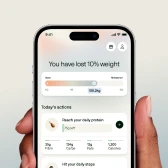Cava, Edda, et al. “Preserving Healthy Muscle During Weight Loss,” Advances in Nutrition, vol. 8, issue 3, 2017:511-519. https://pmc.ncbi.nlm.nih.gov/articles/PMC5421125/.
You might have been losing weight steadily and then find the scale hasn’t moved for weeks, even though your habits and medication haven’t changed.
This is called a weight loss plateau. It's one of the most frustrating parts of any weight loss journey, but here's the thing: it's completely normal. It doesn't mean you're doing anything wrong, and it doesn't mean your body has given up on losing weight.
The good news is that there are practical steps you can take to understand why it's happening and get things moving again. Here's everything you need to know.
Key Takeaways
- Everyone who tries to lose weight will eventually reach a weight loss plateau
- It’s when your weight stops changing, even if you’re doing everything “right”
- Always review the basics first: diet and portions, activity levels, sleep, stress, and hydration
- Medication adjustments may help if you've addressed lifestyle factors and still aren't seeing progress after 4-6 weeks

What is a weight loss plateau?
A weight loss plateau is when your weight stays the same for several weeks, even though you're following your plan. Everyone reaches a plateau at some point during losing weight and it isn’t a sign that you’ve done anything wrong.
It’s also different from the natural slowing that happens after the first few weeks of treatment. Early weight loss is often quicker due to water changes. After that, weight loss usually settles into a steadier pace. A plateau is when there has been no change at all for at least three to four weeks.
Why does weight loss plateau?
There are a few possible reasons.
You’ve gained muscle
If you're doing regular strength training, your muscle gains might offset the fat you've lost. This doesn’t mean you’re not progressing. Muscle is denser than fat, so your weight may stay the same while your body composition improves.
This is why it helps to track progress in other ways too: how your clothes fit, how you feel, changes in strength, or measurements around your waist and hips.
You're no longer in a deficit
As you lose weight, your body needs fewer calories to function. A calorie intake that created a deficit early on may now be closer to maintenance.
For example, let’s say you were eating 1,800 calories a day when you started. At that point, your body might have needed around 2,200 calories to maintain your weight, so you were in a 400-calorie deficit. But now that you’re lighter, your body might only need about 1,900 calories. Suddenly, that same 1,800 calories is barely a deficit at all.
Your routine has shifted
Small changes in activity can have a big effect over time. Fewer steps, less structured exercise, or changes in daily routine all reduce the amount of energy you burn. Even if your diet hasn’t changed, these drops in movement can close the deficit that was helping you lose weight before.
Your body is adapting to weight loss
After a prolonged period in a calorie deficit, your body may respond by conserving energy. It does this by reducing the rate at which you burn energy, making it tougher to lose weight.
Muscle loss adds to this effect. It’s normal to lose some muscle when you lose weight. But this also reduces the amount of energy your body burns at rest. You can prevent muscle loss through strength training, aiming for at least two sessions per week.
Your body is adapting to your dose
If you've been on the same dose for a while, your body may have adapted to it over time. This can mean the appetite suppression you felt initially starts to wear off.
You’ve got a medical condition
Some conditions, such as polycystic ovary syndrome (PCOS), can make weight loss more difficult. If you suspect a medical factor is playing a role, it’s worth discussing with a clinician.
How many weeks long is a weight loss plateau?
Everyone’s different, so we can’t say for sure. A weight loss plateau could last anywhere from a few weeks to a few months.
Will a weight loss plateau go away on its own?
Generally, no. A weight loss plateau will not go away on its own. If you want to lose more weight, you’ll need to adjust your habits.
How to break a weight loss plateau
Before considering any medication changes, check the basics first:
Diet and portions
Start by looking at your diet and portions. Are you still eating the same total calories as when you started? Remember, as you've lost weight, your body now needs fewer calories. What was a deficit before might now be maintenance.
Make sure you're still meeting your protein target, aiming for 1.2-1.6g per kg of body weight per day. Protein supports weight loss and helps preserve muscle mass.
Activity levels
Check your activity levels. Have your daily steps dropped? Has your training become less consistent? Being more active throughout the day, whether that's taking the stairs or dancing in your kitchen, means your body will burn more energy.
If you're not already doing strength training, aim for at least two sessions per week. Gaining more muscle will increase your body's energy needs, meaning you'll burn more calories even at rest.
Sleep, stress, and hydration
Review your sleep, stress levels, and hydration. Poor sleep and high stress can both interfere with weight loss. Make sure you're drinking enough water throughout the day as well.
Know when to consider medication adjustments
Reach out to your provider if:
- You've reviewed the basics and can't find any changes to make.
- You've made changes (like starting the gym, walking more, reducing portions, or adding more protein) but you're still at a plateau after 4-6 weeks of those changes.
Your provider may suggest moving up a dose if side effects are manageable, or in some cases switching to another medication. The goal is steady progress with the right support.
Your weight loss journey
It can be demoralising to feel your weight loss efforts aren't paying off. We get it. But plateaus are normal, and we know you can get through it.
Voy's weight loss programme includes medications like Mounjaro and Wegovy weight loss injections, plus orlistat weight loss pills. You also get a personal weight loss coach and quick clinical support on hand to help you work through plateaus.
Take our quiz to see if you’re eligible.




















